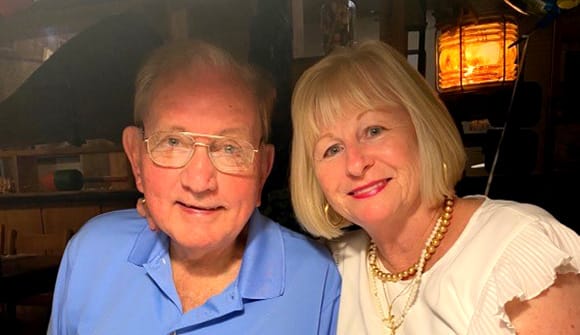Immediate action
Why time made a difference in a doctor’s stroke.
Article Date:

Diane Mayo and her husband, Edwin, a retired primary care physician, were talking when she paused for a moment to pour a cup of coffee. When she walked back to the living room from the kitchen, she noticed something was terribly wrong with her husband.
In the blink of an eye, Dr. Mayo had suffered a stroke.
“He was coughing and it sounded like he was choking. He couldn’t talk, but he moved his hands and his eyes were scary looking,” recalled his wife. “My daughter’s mother-in-law had previously had a stroke, and I recognized some of the signs she told me about.”
Diana Mayo immediately called 911. Within three minutes, the ambulance arrived at their St. Simons Island home and took Dr. Mayo to Southeast Georgia Health System – Brunswick, which offers telestroke care provided by doctors at Baptist Health.
Telestroke is a diagnostic service that allows health care providers to conduct remote hospital-based consultations over a high-definition video connection and an audio call. The service offers instant access to neurologists and neurosurgeons at Baptist Medical Center Jacksonville’s Stroke & Cerebrovascular Center. The providers can remotely assess a patient’s symptoms and recommend a plan of care to the patient’s clinical team.
Doctors consulted with Mohamad Chmayssani, MD, neurocritical care specialist at Baptist Health, via the telestroke service so he could advise them on next steps.
“Time is everything when it comes to successful recovery from a stroke,” said Dr. Chmayssani. “Comprehensive stroke centers like Baptist Health are equipped to care for patients experiencing stroke with the latest technologies. But, most importantly, you have to get to a hospital to receive this care as quickly as possible.”
Dr. Chmayssani recommended tissue plasminogen activator (tPA), a medication given through an IV to people with ischemic stroke to quickly dissolve blood clots and restore blood flow to the brain. Ischemic stroke occurs when a vessel supplying blood to the brain is blocked.
“My husband received the tPA less than 30 minutes from the time he got to the hospital,” Mrs. Mayo said. “Then, they got him on a helicopter to take him to Baptist Medical Center Jacksonville for further treatment.”
Lifesaving procedure
While Mrs. Mayo was on her way to Jacksonville, Ricardo Hanel, MD, PhD, neurosurgeon and co-medical director of Baptist Stroke & Cerebrovascular Center called to tell her he was taking her husband into the operating room to perform a thrombectomy.
“A thrombectomy is a procedure to remove a stroke-causing blood clot from the brain. During the procedure, a catheter is inserted through a patient’s groin to go up to the brain to dissolve the clot,” explained Dr. Hanel.
By the time Dr. Mayo’s wife got on I-95, Dr. Hanel had already completed the procedure. When she arrived at Baptist Jacksonville, Dr. Hanel met her in the hallway outside her husband’s room.
“He hugged me and told me everything was going to be OK,” said Mrs. Mayo. “I couldn’t thank him enough for everything he had done.”
Brain health restored
Dr. Mayo spent just over four days in the hospital, with his wife by his side.
“I stayed with him the whole time,” she said. “All of a sudden, everything started coming back to him – his speech and everything else.”
“Baptist Jacksonville was wonderful. It is a great hospital – they were Johnny-on-the-spot with everything” she said. “Dr. Hanel really stands out in my mind, because he is the one that saved my husband.”
When Dr. Mayo was discharged from the hospital, he spent just a week at an inpatient rehabilitation facility before going home. The doctors expect him to make a full recovery.
“I don’t remember anything about what happened, other than waking up after the surgery,” said Dr. Mayo. “The doctor came in my room and told me he expected me to make a full recovery. He has certainly been right about that. I’m pretty much back to normal now – he did a fantastic job.”
“If you suspect a loved one is having a stroke, call 911 right away, just like Mrs. Mayo did,” said Dr. Chmayssani. “The faster you seek help, the better opportunity for recovery."
Time is brain when it comes to stroke. BE FAST and call 911 if you or a loved one experiences any sudden loss of balance, vision changes, facial drooping, arm weakness or speech difficulty. Lyerly Neurosurgery offers expert treatment for stroke and resources for cerebrovascular care. To request an appointment, call 904.388.6518.



